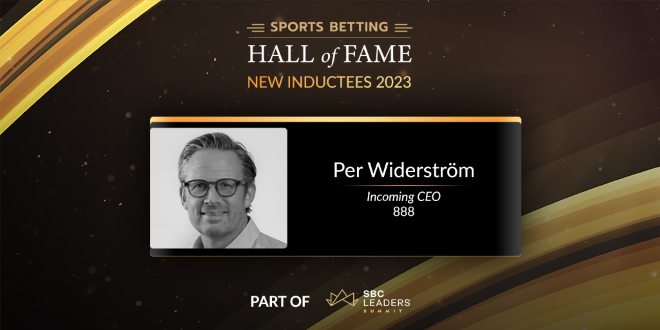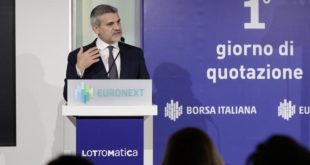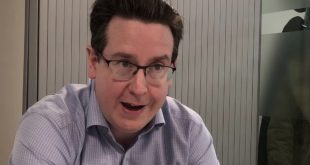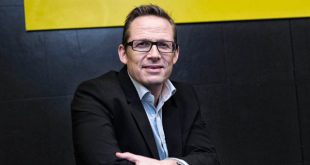If you had asked a young Per Widerström at the age of six about his dreams, the answer would have been crystal clear – Per wanted to be a professional football player.
However, while football might have missed out on a future star, a different field gained something extraordinary: a determined leader and innovative thinker.
Widerström boasts an illustrious career spanning 32 years, both within and outside the gambling industry, with his experiences formed in Sweden, Norway, Denmark, the UK, Ukraine, Malta, Gibraltar, Spain, and the Czech Republic.
He has held multiple C-level positions and navigated the realms of both market leaders and challengers, but he certainly has no problem pointing out a recurring theme in his career – a focus on transformative endeavours. In his professional journey, Per has always revolved around guiding companies through transformative phases and cultivating an exemplary company culture, all driven by ambitious goals and expectations.
It should come as no surprise that Widerström, who is due to take the helm of 888 as CEO on 16 October 2023, earns his well-deserved spot in the 2023 roster of Hall of Fame honorees.
The induction will take place as part of the SBC Leaders Summit, scheduled for September 18 at the W Hotel in Barcelona, just before the flagship SBC Summit Barcelona event set to grace Fira Barcelona Montjuic from September 19-21.
Life Lessons at 19
Widerström has experienced what it’s like to be ‘managed by fear.’ The future 888 CEO began playing football at the age of six and went on to play semi-professionally for his local team, Örebro SK.
By 18 he was being trained by a ‘very demanding but highly competent coach,’ Roy Hodgson, acting manager of the English Premier League team Crystal Palace, who has had a storied career coaching the likes of Inter Milan and Liverpool.
Per’s life revolved around football until he turned 19 when an injury changed everything.
Despite his passion for the beautiful game and the associated stereotypes of neglecting academics, Per consistently maintained good grades. He didn’t let go of his competitive spirit when he transitioned away from football; instead, he redirected it toward business.
After completing his bachelor’s degree in business administration at the University of Gothenburg, he moved to London in 1990 to pursue a master’s degree in international accounting and finance at the London School of Economics.
His first job came in 1991. “That wasn’t the best time for applying for work,” he reflects jokingly. Whilst still living in London, he was approached by Andersen Consulting to essentially be a programmer and went through a five-week induction training in Chicago.
“That was close to brainwashing and an introduction to corporate culture. Programming was a new world for me; I did coding and worked with Cobol and SQL at the time. It was tremendously hard work – 70-80 hour working hours per week. These were still the times when you were required to wear a black suit and a white shirt underneath with a tie.”
Following his tenure at Andersen Consulting, Per embarked on a role at the consumer goods giant, Procter & Gamble, where he dedicated four years of his career. Throughout this period, he held the position of Senior Project & Supply Chain Manager, marking his initial foray into a market-leading organisation. He continued his professional journey at CapGemini, a prominent French multinational specialising in information technology services and consulting.
Coca-Cola & the World of Corporate Politics
Coca-Cola is marked as an early formative experience for Per who joined the company in 1996 as a Sales & Business Development Manager and later transitioned into the role of Director of Operational Marketing & Business Development in 1999.
“Coca-Cola was a company with an exceptionally strong corporate culture,” he explains. “They truly held the secret recipe for success in the marketplace.”
“The recipe for Coca-Cola (the drink) was a closely guarded secret. We were tasked with setting up a manufacturing plant in Sweden from scratch, and the process revealed that there was no one with a full, holistic view.”
He describes working for a top-tier company as an experience where satisfaction remains elusive. The Coca-Cola CEO would say, “I won’t be satisfied until I can turn on the tap water and have Coca-Cola coming out of it.”
During his tenure there, Per also gained valuable insights into the world of corporate politics.
“When you’re successful, it’s easy to become complacent. I observed this complacency among senior members at Coca-Cola, which ultimately was one of the factors that led me to explore new opportunities.”
At the time, the internet was booming, so Per decided to leave behind the security of his role at Coca-Cola and co-founded Wannago.com, an event ticket aggregation platform, “something like Ticketmaster,” to expose himself to the so-called ‘New Economy.’
However, as Per puts it himself, he was “late to the party,” which eventually led him to transition into the telco market.
Bringing Companies to New Heights
This transition brought Per his first CEO position at Telenor Mobile Sweden between 2001 and 2004, followed by two years as Vice President & COO of the Ukrainian mobile operator Kyivstar.
While at Telenor, even though the modus operandi was largely set, Per faced a significant challenge. As CEO, he had to establish operations in Sweden from scratch. As for Ukraine, Per faced a very different set of challenges.
He had to devise a strategy and drive growth in a market where there was no golden recipe to start with. So, he had to find a way to win in the marketplace and capture customers.
Also, this was his first exposure to Eastern Europe. His time in Ukraine coincided with the Orange Revolution, a series of protests and political events that took place from late November 2004 to January 2005, following the run-off vote of the 2004 Ukrainian presidential election.
“It wasn’t a culture shock, but it was a culture change,” Per recalls. He couldn’t speak the language, so he always had an interpreter with him.
Despite facing cultural and corporate governance challenges (the company was also partly owned by the Russian Alfa Group), Per’s goal was clear – to make Kyivstar the number one mobile operator in Ukraine.
Under his leadership, they went from between two and three million subscribers to almost 14-15 million in just two years.
This experience taught Per a valuable lesson in stark contrast to his time at Coca-Cola – to be humble and learn to gain the trust and support of local teams.
Reflecting on his diverse career journey, Per acknowledges that his time at FMCG (Fast-Moving Consumer Goods) giants Procter & Gamble and Coca-Cola provided him with invaluable insights into marketing and selling consumer products. However, his pivot into the telco industry opened up a new world for him, delving deeper into the realm of technology and data communication.
The transition to iGaming
When approached by a headhunter with an opportunity in the online gaming sector, Per thought it was a perfect match for someone with both a technical foundation and consumer expertise. It was also an excellent chance to work in an emerging industry, not just as an employee but also as the CEO and Director of expekt.com. He held this position from 2006 to 2010 which was a period characterised by transformation leading to a tripling of the underlying financial performance and a sale of the company to Mangas Gaming Group.
In 2010, Widerström was appointed COO of PartyGaming and was part of the team assembled to create the right conditions for the upcoming merger with operator Bwin.
“It was like a marriage of two equals. It’s crucial to be exceptionally clear about what the new company is going to look like. The starting point should always be a common vision, shared aspirations, and the strategy needed to make it a reality.”
“It’s also about company values — how do we work together? Both sides need to demonstrate their ability to add value to the new entity and capitalise on it.”
“And then you need discipline to execute the plan.”
However, he pauses. “Ultimately, it’s about people, even in a technology-driven sector. It’s all about having the right people in the right positions.”
The two merged in 2011, and Widerström left in November of the same year. Reflecting on the merger, he notes: “Without further explanation, all I can say is that the co-CEO arrangement is far from ideal.”
Indeed, the merger was not as successful as planned and Bwin.Party’s shares were dropping. Following a bidding process between industry giants, the company ended up accepting GVC’s offer, and the transaction was completed in early 2016.
The following venture entailed taking on dual roles: serving as the Managing Director and Chairman of the Board at Gala Interactive, while also assuming the position of Chairman of the Board at Gala Coral Interactive.
Widerström undertook a challenge in Gibraltar, where he spearheaded the establishment of an operation for Gala Coral from the ground up. This venture necessitated a comprehensive transformation involving changes in technology and processes. “We had a clear strategy and vision, and then we brought in external talent to help build a company entirely from scratch.”
“We grew the company by three times within three years.”
However, a significant opportunity arose for Widerström to assume the role of CEO, leading to his departure in 2014.
Concurrently, the industry was experiencing a surge in mergers and acquisitions. Gala Coral merged with Ladbrokes shortly after his exit, and eventually, like Bwin.Party, became a part of GVC in 2018.
Rolling the Dice as CEO of Fortuna
The opportunity was with the Fortuna Entertainment Group.
As the CEO, his greatest challenge was navigating the cultural and organisational resistance to change when he joined as a foreigner in the Czech Republic. Penta, owning 100% of the company, was seeking a different direction and had a clear ambition of making Fortuna the number one operator in Central Eastern Europe.
However, transforming Fortuna into an ambitious, change-oriented organisation required setting a new vision, fostering a cultural shift, and overcoming initial resistance.
“People do not like change. People who have built up their own status find it hard to be transparent with newcomers because they bring change. And change oftentimes comes with defensiveness and uncertainty. For me, it should be about empowering people with information, world class toolkit and the autonomy to drive value.”
But Per’s efforts proved fruitful. He concentrated on operational excellence, technology, and, once more, on the people, building a robust foundation the company could capitalise on. The real success came from Widerström’s ability to transform the mindset. Once again.
In 2022, after seven years in the role and growing the business more than fivefold in size, Per felt the need to reinvent himself and broaden his horizons. This led him to take on roles as a board member on eight different boards, of which he was chairing five of these companies. These included three private equity-owned companies in the financial services sector, one venture capital-owned SAS and marketplace company, a publicly listed lead generation company, a publicly listed leading online bank in the Nordics, and a startup specialising in AI and automation. “I wanted to explore how things appear from the other side of the (non-executive) perspective.”
Up Next… 888 Calls
Per discusses his decision to take on the role at 888 Holdings by highlighting the key factors that drew him to this opportunity. First and foremost, it was the prospect of working with two legendary companies, William Hill and 888, both with a rich legacy in the betting and gaming sector.
Yet, it was the assignment itself: “the opportunity to be the CEO of this giant, focusing on setting a clear vision, strategy, and execution plan to elevate 888 to the top of the regulated and listed betting and gaming companies.”
Widerström is set to begin his role as CEO on 16 October, but he is already focused on effective preparation for his new position.
“What I’m working on now is defining my first Hundred Days plan, but also, on top of that, considering what needs to happen before I take on the role.
“For me, it’s crucial to hit the ground running from day one when I officially start.”
As a CEO, the most important things for Per are to have a clear vision and destination, with a well-defined strategy set for execution, and foster the right culture with a distinct value creation mindset. “This is in order to deliver an exceptional customer experience as well as value creation. There will be a strong focus on product delivery and compliance as well.”
As a leader, Widerström’s motivation is rooted in being part of teams that have transformed companies and made a mark in history.
“This is why I believe that the best is yet to come.”









